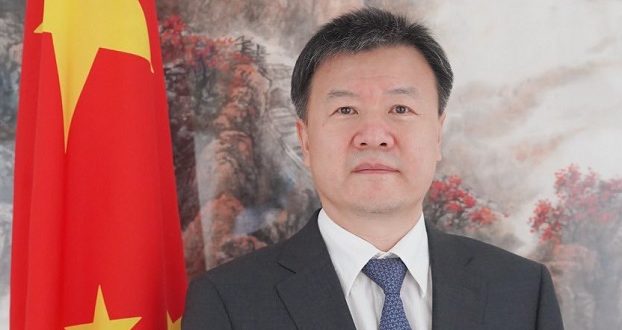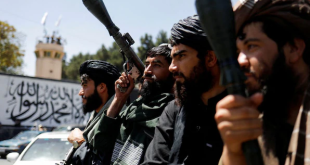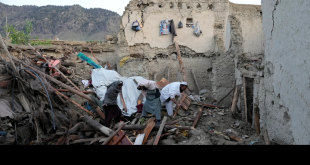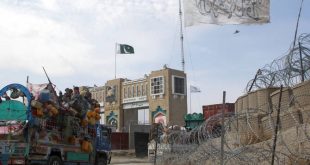By Wang Yu, Chinese Ambassador to Afghanistan
The year 2020 was a tough one for both China and Afghanistan. It was also a year of change and progress for both. In the COVID-19 pandemic and amid major changes unseen in a century, the global economy is mired in its deepest recession since World War II and multilateralism and the international order are confronted with unprecedented challenges, which has created considerable obstacles to China’s development in the economic and other fields and added many uncertainties to the peace and reconciliation process in Afghanistan. Fortunately, thanks to the support of the peace-loving Afghan people, regional countries and the international community, intra-Afghan negotiations have officially begun, opening a window of opportunity to end the long-running conflict in Afghanistan. In this process, China has been playing an active and constructive role.
I have been Chinese Ambassador to Afghanistan for over a year. In the past year, I have worked here in Afghanistan and met many people. I have participated in all previous international conferences on Afghanistan and witnessed with my own eyes the peace process getting on track and making progress. I have in this course gained a deeper appreciation of the role of China, Afghanistan’s friendly neighbor connected by mountains and rivers, as an important supporter, mediator and facilitator in the Afghan peace and reconciliation process.
China firmly supports the Afghan-led, Afghan-owned peace and reconciliation process. The Afghans must take control of their own destiny. No external force is to impose itself on Afghanistan or use Afghanistan for its own selfish gains. Both China and Afghanistan have suffered enormously from colonialism, imperialism and bullying. China shares the Afghan People’s desire for peaceful development. All along, the Chinese side has firmly supported all stakeholders to the Afghan question to achieve peace by political means. It has actively participated in and promoted the Afghan peace and reconciliation process in bilateral and multilateral arenas and pushed the international community to foster common understandings. Chinese State Councilor and Foreign Minister Wang Yi has made the following proposals for intra-Afghan negotiations:
First, stick to the fundamental direction of a political settlement. Dialogue and negotiation are the only way out for the Afghanistan question. All parties to the peace talks are brothers. They should follow the trend of the times and the voice of the people, dissolve old grievances and differences and achieve genuine reconciliation. It is hoped that the political parties in Afghanistan will have firm confidence, patience, sincerity and determination in the peace talks.
Second, adhere to the basic Afghan-led principle. The destiny of Afghanistan is in the hands of the Afghan people themselves. The Afghan-led, Afghan-owned concept should be earnestly upheld. No country should engage in a geopolitical contest in Afghanistan and no one should seek selfish gains from the Afghan question.
Third, pursue unswervingly an extensive and inclusive framework goal. The parties to the negotiations should work together to build a widely representative and inclusive political power structure with equal participation and power-sharing among all Afghan parties, groups, ethnicities and religious sects, which combats terrorism with unwavering determination and pursues a foreign policy of peace and friendship.
Fourth, seek solutions that address both the symptoms and root causes of the Afghan question. In addition to the war and related chaos as the biggest challenge, Afghanistan also faces difficult problems such as poverty, refugees and drugs. All parties in the negotiations need to pool their wisdom and work together. We hope that all parties concerned will take stock of the overall interests of the country and the people’s livelihood and collaborate with one another to create a virtuous circle of peace and development in Afghanistan.
Fifth, sustain international efforts to uphold justice and fulfill responsibilities. The international community and countries in the region should uphold justice and support the negotiations to achieve peace instead of moving away from peace. Foreign military forces should be withdrawn in an orderly and responsible manner and care should be given to preventing terrorist groups from seizing the opportunity to create chaos and ensuring a smooth transition in Afghanistan.
China has been mediating between all parties to the Afghan question. As State Councilor Wang put it, as a close neighbor and sincere friend, China hopes more than any other country for Afghanistan to achieve peace and stability. China sincerely hopes that the two sides of the Afghan peace talks will focus on their common interests, resolve their differences and turn their swords into ploughshares in continued pursuit of a political settlement and an extensive and inclusive framework goal. China and Afghanistan have never fought any war or engaged in any conflict with each other since ancient times. The two sides have long treated each other with mutual respect and help. China has developed profound friendship with all stakeholders to the Afghan question, facilitated talks and promoted peace between them. Its positive role has won wide acclaim. China has contributed its wisdom and propositions and facilitated such mechanisms as the China-Afghanistan-Pakistan foreign ministers’ dialogue, the China-Russia-US consultation, the China-Russia-Iran-Pakistan special representatives meeting and the Shanghai Cooperation Organization-Afghanistan Liaison Group, all designed to serve as a platform and create conditions for peace and reconciliation in Afghanistan.
China actively facilitates the Afghan peace and reconciliation process. We follow closely the latest developments in the process and worked actively and constructively for it. We call on all parties in Afghanistan to put the interests of their country and people first, engage in negotiation and find therein a result and peace. China will continue to provide assistance within its capacity for the second round of intra-Afghan negotiations. We are ready to provide a platform for dialogue and exchanges among all Afghan parties and assist in the peace and reconciliation process on the basis of respect for their own wills. China calls on the international community to take full account of the current situation in Afghanistan, continue providing training, financial and technical support for capacity-building by the Afghan national security forces, help the Afghan side to deal effectively with such threats as terrorism, transnational crime and drug smuggling, support Afghanistan in implementing the National Peace and Development Framework (2021-2025) and jointly tackle poverty, refugees and terrorism.
Representatives of the Afghan government and the Afghan Taliban reached a preliminary agreement in Doha, which was the first time in 19 years. It is also a good basis for the second round. China welcomes and appreciates the progress made in the intra-Afghan negotiations. It is the long-cherished wish of the Afghan people to achieve peace and stability as soon as possible. After so many years of war, the Afghan people deserve a more peaceful, stable and better future. We sincerely hope that the two sides of the peace talks will put national interests above everything else, comply with the will of the people, move towards each other and negotiate and achieve peace at an early date. China is ready to continue playing a constructive role in this regard together with the rest of the international community.
China and Afghanistan are good friends, brothers and neighbors. We have been facilitating the peace and reconciliation process in Afghanistan with a deep belief that a major country must protect justice as its critical interests. China treats Afghanistan as its equal, pursues mutual benefit in our exchanges and sincerely hopes that peace will prevail in Afghanistan and that its people will embrace a better life and a bright future.
Five years ago, during the General Debate at the 70th Session of the UN General Assembly, Chinese President Xi Jinping proposed a five-in-one approach to building a community of shared future for mankind. Over the past five years, the China-Afghanistan community has further developed as our two countries engage in cooperation under the BRI framework, expand regional connectivity and join the common fight against COVID-19, with increased mutual trust, deeper people-to-people exchanges and more fruitful results. Not long ago, on the 12th BRICS summit, China joined to write into the declaration: ‘[the leaders] call for long-term peace in Afghanistan, reiterate China’s firm support to the Afghan people in building a stable, inclusive, peaceful, independent and prosperous sovereign state, welcome the launch of intra-Afghan negotiations, and will continue supporting the Afghan-led, Afghan-owned peace process’. The move reaffirmed China’s firm support for the Afghan Peace and reconciliation process and its firm commitment to make due contribution to the orderly advancement of intra-Afghan negotiations.
As the peace and reconciliation process in Afghanistan comes to a crucial phase, China sincerely hopes that all parties on the Afghan question will seize the opportunity of peace, turn hostility into amity, and reach an agreement on domestic political arrangements at an early. These will help the Afghan people to get rid of the haze of war, usher in long-lost peace and embrace a bright future.
 Afghanistan Times
Afghanistan Times




